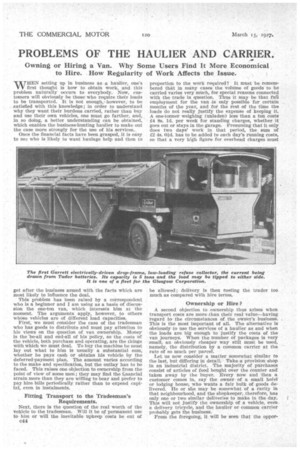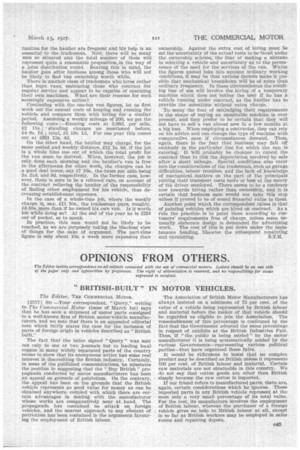PROBLEMS OF THE HAULIER AND CARRIER.
Page 66

Page 67

If you've noticed an error in this article please click here to report it so we can fix it.
Owning or Hiring a Van. Why Some Users Find It More Economical to Hire. How Regularity of Work Affects the Issue.
WHEN setting up in business as a haulier, one's first thought is how to obtain work, and this problem naturally occurs to everybody. Now, customers will obviously be those who require their loads to be transported. It is not enough, however, to be satisfied with this knowledge ; in order to understand why they want their burdens carried, rather than buy and use their own vehicles, one must go farther, and, in so doing, a better understanding can be obtained, which enables the business-hunting haulier to make out the case more strongly for the use of his services..
Once the financial facts have been grasped, it is easy to sea who is likely to want haulage help and then to get after the business armed with the facts which are most likely to influence the deal.
This problem has been raised by a correspondent who is a beginner and I am using as a basis of discussion the one-ton van, which interests him at the moment. The arguments apply, however, to others Wiese vehicles are of different load capacities.
First, we must consider the case of the tradesman who has goods to distribute and must pay attention to his views on the question of van ownership. Money is the 'be-all and end-all of his policy, so the costs of the vehicle, both purchase and operating, are the things with which we must deal. To buy the machine he must lay out what to him is usually a substantial sum, whether he pays cash or obtains his vehicle by the deferred-payment plan. The amount varies according to the make and specification, but the outlay has to be faced. This raises one objection to ownership from the point of view of some men; they may find the financial strain more than they are willing• to bear and prefer to pay hire bills periodically rather than to expend capital, even in instalments.
Fitting Transport to the Tradesman's Requirements.
Next, there is the question of the real worth of the vehicle to the tradesman. Will it be of permanent use to him or will the inevitable upkeep costs be out of c44 proportion to the work required? It must be remembered that in many cases the volume of goods to be carried varies very much, for special reasons connected with the trade in question. Thus it may be that full employment for the van is only possible for certain months of the year, and for the rest of the time the loads do not really justify the expense of keeping it. A one-tonner weighing (unladen) less than a ton costs £4 8s. id. per week for standing charges, whether it goes out or stays in the garage. Presuming that it only does two days' work in that period, the sum of 12 4s. Old. has to be added to each day's running costs, so that a very high figure for overhead charges must be allowed ; delivery is then costing the trader too much as compared with hire terms.
Ownership or Hire ?
A second objection to ownership thus arises when transport costs are more than their real value—having regard to the circumstances of the owner's business. This is the most important of all. The alternative is obviously to use the services of a haulier as and when the loads are big enough to justify the costs of the van journeys. When the number of packages is very small, an obviously cheaper way still must be used, namely, the distribution by a common carrier at the rate of so much per parcel.
Let us now consider a matter somewhat similar to the last, but differing in detail. Take a provision shop in an industrial district. The majority of purchases consist of articles of food bought over the counter and taken away by the buyer. Every now and 'then a customer comes in, say the owner of a small hole] or lodging house, who wants a fair bulk of goods delivered. He or she may be somewhat of a rarity in that neighbourhood, and the shopkeeper, therefore, has only one or two similar deliveries to make in the day. This will not justify the ownership of a vehicle, even a delivery tricycle, and the haulier or common carrier probably gets the business.
• From the foregoing, it will be seen that the oppor tunities for the haulier are frequent and his help is an essential to the tradesman. NoW, there will be many men so situated and the total number of them will represent quite a reasonable proposition.in the way of a joint distributien round. Bearing this in mind, the haulier goes after business among those who will not. be likely to find van ownership worth while.
There is another class of tradesman who hires rather than buys vans, embracing those who contract for regular service and appear to be capable of operating their own machines. What are their reasons for Such seemingly expensive action?
Continuing with the one-ton van figures, let 'us first work out the annual costs of. keeping and running the vehicle and compare them with hiring for a similar period. Assuming a weekly mileage of 200, we get the following costs :----Running costs at 3.06d. per mile, 12 standing charges as mentioned before, 14 8s. id.; total, £6 19s. ld. For one year this comes out at £361 12s. 4d.
On the other hand, the haulier may charge, for the same period and weekly distance, £12 Is. 8c1. if the job is a whole time one out of which the total profit for the van must be derived. When, however, the job is only done each morning and the haulier's van is free in the afternoons for other work, the charges can be a good deal lower, say £7 10s., the rates per mile being Is. 2id. and 9d. respectively, In the former case, however, there is sure to be a reduced' rate, on account of the contract relieving the haulier of tbe responsibility of finding other employment for his vehicle, thus decreasing establishment expenses.
-In the ease of a whole-time job, where the weekly charge is, say, £11 10s., the tradesman pays, roughly, 14 10s. more than if he owned his own van. Is it worth his while doing so? At the end of the year he is £234 out of pocket, so to speak.
In practice, this sum would not be likely to be reached, as we are purposely taking the blackest view of things for the sake of argument. The part-time figure is only about 10s. a week more expensive than
ownership. Against the extra cost of hiring must be set the uncertainty Of the actual costs to be faced under the ownership scheme, the fear of making a Mistake in selecting a vehicle and uncertainty as to the permanence of the need for the services of the van. Whilst the figures quoted take into account ordinary working conditions, it may be that various factors make it passible that me.chanical breakdown will be of more than ordinary frequency. In these circumstances the resulting loss of use will involve the hiring of a temporary machine which does not bother the user if he has a vehicle running under contract, as the haulier has to provide the substitute without extra charge.
To many the fear of misjudging their requirements in the shape of buying an unsuitable machine is ever present, and they prefer to be certain that they will not have to sell a van almost new in a few months at a big loss. When employing a contractor, they can rely on his advice and can change the type of machine with comparative ease if circumstances demand. Then, again, there is the fear that business may fall off suddenly in the particular line for which the van is catering. It will probably be cheaper to cancel the contract than to risk the depreciation, involved by sale after a short mileage. Special conditions, also enter into the considerations of the tradesman, such as garage difficulties, labour troubles, and the lack of knowledge of mechanical matters on the part of the principals putting their transport costs more or less at the mercy of the driver employed. There seems to be a tendency • now towards hiring rather than ownership, and it. is certain that .business men would not take this step unless it proved to be of sound financial value to them.
Another point which the correspondent raises is that of painting vehicles which are hired on contract. As a rule the practiceis to paint them according to customers' requirements free of charge, unless some unusually, elaborate design is demanded for advertising work. The cost of this is put down under the maintenance heading, likewise the subsequent repainting and varnishing.












































































































